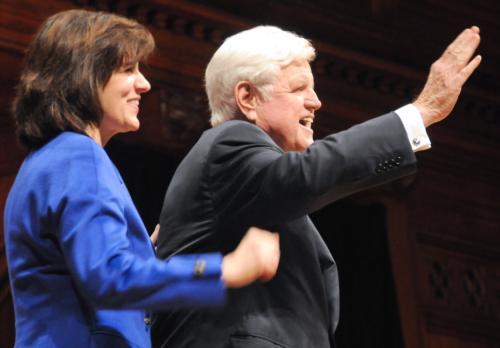Senator Edward M. Kennedy ’54-’56, the liberal lion who has represented Massachusetts for nearly a half century and was diagnosed with brain tumor in May, received an honorary degree from Harvard at a convocation ceremony in Sanders Theatre yesterday afternoon.
Over 50 years after he graduated from the College with a degree in Government, the youngest member of the famous political family was honored for his lifetime commitment to public service.
“I hope that in all the time since then I have lived up to the chance Harvard gave me,” Kennedy said after he received a doctorate of laws from University President Drew G. Faust.
Any fears the senator may have had were likely assuaged yesterday by the words of praise from the ceremony’s speakers and multiple standing ovations he received from the packed theatre.
“He’s one of a kind,” Senator John F. Kerry, who has been Kennedy’s colleague for 24 years, said in a brief interview after the ceremony. “It’s a privilege to serve with him.”
Kennedy was originally scheduled to receive the honor during Commencement last spring in a surprise announcement that came two weeks after the senator was diagnosed with the malignant brain tumor. Because his medical treatment prevented him from appearing at the ceremony, Faust chose to honor the lawmaker at the special event yesterday.
The senator received his honorary degree in front of an audience that included Kerry, Senator Christopher J. Dodd of Connecticut, and Vice President-elect Joseph R. Biden, Jr., who received a standing ovation when he entered the theatre.
Tickets to the event were originally distributed by invitation and through a lottery organized by the Institute of Politics. More tickets were made available at the Science Center yesterday afternoon.
The ceremony began with footage of a young Kennedy scoring the only touchdown at the 1955 Harvard-Yale Game, which garnered the applause of the present-day audience.
Faust mentioned this achievement, which she referred to as “perchance his most legendary achievement,” in her speech, and described the section of his Senate Web site biography that details his famous touchdown and the subsequent offer to play for the Green Bay Packers.
“Fortunately for all of us not from Wisconsin, he turned them down,” she said, telling the audience that he told the Green Bay coach he wanted to “‘go into another contact sport, politics.’”
Kennedy and his wife, Victoria, took the stage as the Harvard University Band performed “Ten Thousand Men of Harvard.”
The Reverend Professor Peter J. Gomes followed the introduction of the event with a prayer and James B. Onstad ’09 sang “America the Beautiful.” Onstad also performed “Fair Harvard” later in the ceremony.
Supreme Court Justice Stephen G. Breyer, a former Harvard Law School professor who served as chief counsel for the Senate Judiciary Committee when Kennedy was chair, spoke about what he had learned working for the Massachusetts senator. Breyer described Kennedy’s strong commitments to bipartisanship and helping others.
“I’m proud to be here as Harvard says ‘Well done, senator, and thank you for caring about so many, so much, for so long,” Breyer said.
Cellist Yo-Yo Ma ’76, who performed with pianist Charlie Albright ’11, saluted the senator before he began playing two Gershwin preludes. The Kuumba Singers also performed during the ceremony.
Kennedy beamed and mouthed, “Thank you very much,” to the crowd as he received his honorary degree from Faust.
During his remarks, Kennedy spoke of his excitement following the election of Barack Obama, who he had campaigned for aggressively, calling this “a season of hope.”
“There is no other time I would rather receive this honor than at this time at this turning point in American history,” Kennedy said.
The band concluded the convocation with multiple verses of “Ten Thousand Men of Harvard,” and Kennedy sang along and gave the audience a thumbs up as he left the stage.
The event marked one of the few times that Harvard has given an honorary degree outside of the June Commencement. Three heads of state—George Washington, Nelson Mandela, and Winston Churchill—are the only people to receive similar awards at special ceremonies.
“Now I have something in common with George Washington, other than being born on February 22,” Kennedy said. “It is not being president as I had once hoped.”
—Staff Writer Lauren D. Kiel can be reached at lkiel@fas.harvard.edu
Read more in News
Pinker Debates Religion













